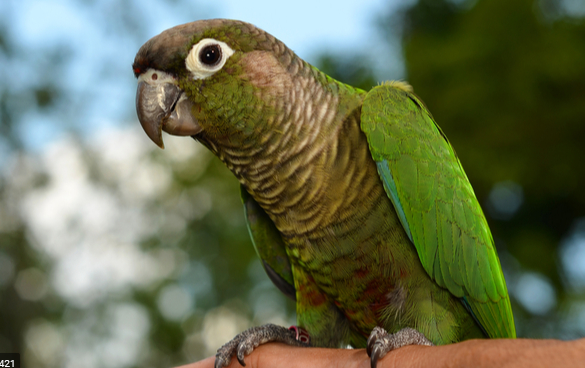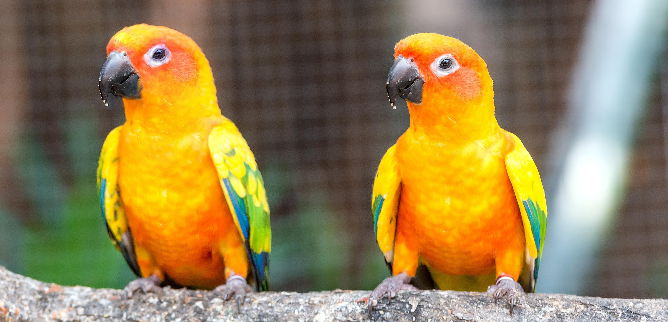Are you overwhelmed by the captivating beauty of the Conure bird? Do you want to keep a Conure bird as a pet? Are you worried about how to take care of your Conure bird?
If yes, then you have just rightly scrolled. Read the article, “How to take care of a Conure?” carefully get all the basic tips and tricks about a Conure bird.
How to Take Care of a Conure?

How to take care of a Conure? Conures are always a source of attraction for owners because of their interesting and charming personality. They have varied kinds for owners to make them a beauty of their home.
The Conure bird is a highly social pet. He needs a spacious cage to live in and to adjust his toys in it. The conure cage should be 32 inches long, 24 inches in height, and 24 inches in width approximately. Cover his cage at night and keep it away from the kitchen’s smoke.
Conure Bird loves to take a bath, so he needs a bathing dish too. The Conure diet should consist of all the essential nutrients having fresh fruits, veggies, their seeds, and as well as the diet purchased from a well-reputed brand.
Conure bird needs many toys which they keep in their conure cage to play with. Conures can be prone to feather plucking, boredom, or any mental stress. They should have a complete medical examination by a vet to keep them healthy and happy.
Types of Conure Birds
Many Conure species are present on Earth. They have eye-catching colors and mesmerizing comical personalities. The Conure bird has different colors like blue, green, yellow, and orange. Conure bird can live up to 25- 30 years if its needs are meeting up.
The Sun Conure bird has a yellow to orange body. It is 12 inches. Sun conure is fun-loving, affectionate, and learns tricks readily. Sun Conure food consists of peas, beans, and seeds mostly.
Conure breeds are widespread in Australia. Sun Conure behavior becomes stressed sometimes if he does not get enough time to play with toys.
Pineapple Conure is a result of a mutation of Cinnamon and Yellow sided Conure. It is a variation of fancy Green Cheek Conure.
Jenday Conure, Nanday Conure, Blue Crowned Conure, Maroon Bellied Conure, Peach Fronted Conure, Dusky Headed Conure, Red Masked Conure, and Petagonian Conure are types of Conure Birds.
Yellow Sided Green Cheek Conure
Several color mutations have occurred in the domesticated Green Cheek Conure bird. The Yellow Sided Green Cheek Conure or fancy Green Cheek Conure looks the same as Green Cheek Conure from behind.
Yellow Sided Green Cheek Conure differs from natural conure breeds regarding a bright yellow chest.
The tail color of Yellow-Sided Green Cheek Conure varies from maroon to bright red. Their feet and beak are bright colored.
The eyes of Yellow-Sided Green Cheek Conure are dark as compared to Green Cheek Conure. The plumage and beak of such conure breeds get lighter in the subsequent generations. Their hatchlings are covered with white down.
Green Cheek Conure Size

The Green Cheek Conure size is about 10 inches long, measuring from the head to the end of the tail.
Green Cheek Conures are social birds. They love to interact with humans. They are habitual to chewing. In captivity, you should provide them with bundles of toys to chew on.
They require regular mental stimulation. The Conure cage should contain various foraging toys that can serve the purpose. Ensure that their toys are strongly attached. As they may unscrew causing injury to your Conure bird.
Healthy Conure species are healthy, active, and social. He eats and drinks all day long. He has bright, dry eyes, and dry nares.
Healthy Conure breeds have the normal appearance of beaks, legs, and feet. They have well-groomed and smooth feathers.
Green Cheek Conure Care
In this section, I will discuss several guidelines about Green Cheek Conure Care. You should follow them to get a healthy Conure bird.
Regularly clean the Conure cage with a 3 % bleach solution. Rotate new toys, dishes, and perches into your Conure cage. Don’t forget to remove the old or damaged ones.
Make sure that there are no galvanized, lead, zinc, or lead-based paints, parts, or toys surrounding your Conure breeds. They can cause serious health issues to your bird.
Use a natural cleaning agent instead of an artificial one. Must get information about the symptoms of Conure species diseases and instantly visit his avian if you feel any abnormal change.
Baby Green Cheek Conure
How to take care of a Conure? The health of the baby Green Cheeked Conure depends on the mother Green Cheeked Conure.
First, you need to set a box in any corner of the Conure cage which helps the pair to breed. Clean the box regularly otherwise, it will cause diseases to the female conure.
The disease in the Conure breeds and its duration can cause the passing of disease to their next generations. Secondly, you need to keep the nest warm enough to balance the fluctuations of temperature in the body.
Take care of her diet especially use calcium supplements before and after breeding. Avoid breeding before 1 year.
When they lay eggs after a 22 – 25 days period, these eggs hatch and you can get a baby Green Cheeked Conure. They need a proper diet and care till the age of 1 year. Proper diet and temperature should be maintained for a few months for healthy growth.
Green Cheek Conure Diet
A Green Cheek Conure diet should be balanced to get a healthy and fit Conure bird. The Conure breeds special pellets should make up about 60-70 % of their regular diet.
There must be fruits, vegetables, and a small number of fortified seeds in the diet of your Conure bird. Better to provide them with fresh ones.
You should provide filtered, clean, and chlorine-free water to your bird. Water should be changed on a regular basis.
Avocado, chocolate, alcohol, caffeine should not be served to Conure breeds. They can pose serious health problems to your bird. Avoid food that is high in sugar and fats.
Occasionally, give your Conure bird treats. But they should not exceed 10 % of the whole food. Remove the eating stuff after a few hours otherwise, it may become a source of bacteria.
Conure Lifespan

The Conure lifespan on average is up to 20 years in captivity. They are one of the most varied parrot breeds.
The average Green Cheek Conure lifespan is about 20+ years. Their lifespan largely depends on several factors including proper care in captivity.
In the wild, Conure species are prone to predator attacks. So, their lifespan is shorter as compared to that in captivity.
For a longer lifespan, provide your Conure bird with an enriched environment. Your bird should get regular opportunities to play and exercise.
You should also provide him with staple items for chewing. So, habitual chewing cannot be a threat to his life. Regular avian check-ups of Conure are essential. It will help to diagnose and treat diseases at an early age.
How Do You Take Care of a Conure?
How to take care of a Conure? Before getting a Conure bird you should be knowledgeable and skilled to take care of him. Consider your Conure just like a baby.
Despite a balanced diet, clean water, and shelter provide him all the necessities like hygiene and foraging toys. for a healthy life.
Are Conures Easy to Care For?
Conure breeds are social, and they need regular interaction with humans. Otherwise, they will be bored and can have behavioral issues.
If you have a tough schedule, then the Conure bird will not be a good choice for you. They are family pets and do not mind socializing for hours. Your Conure bird will be happier and entertained with more fun stuff and activities.
Are Conures High Maintenance?
Yes, the Conure bird is as high maintenance as a pet. Conure breeds are social creatures, and they need regular time and attention.
If you are out of home most of the day, place your Conure cage in a sunny room where people are usually present. But only suitable for those who do not mind noisy squawks and cleaning feathers.
You cannot keep a Conure bird if you live on your own or stay outside most of the time of your day.
How Long Can A Conure Be Left Alone?
The Conure bird can be left alone for 6-8 hours maximum. They are intelligent birds and can memorize your schedule.
Conure breeds love socializing. They require human company and interaction for a minimum of two hours daily. If you have a full-time job, then you should keep them in pairs or with their parents. This will make them less dependent on you.
Takeaway
Terminating my article, “How to take care of a Conure?”. Among all the tips to take care of your Conure bird love and affection is at the top of the list.
Any material like the Conure cage, diet, surroundings, and toys cannot replace you. Your attention, interaction, and love for your bird are something he needs the most. Don’t ever ignore your loving bird.
